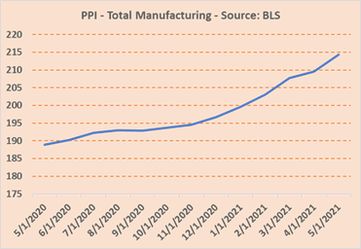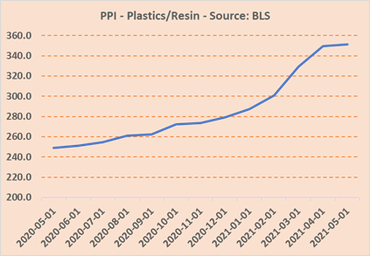|
With significant pressures building, PE firms and Their Portfolio Companies Need to Act Proactively As Recent Supply Chain Distruptions are Creating Inflation  “Good luck finding a rental car in Hawaii! My friend ended up renting a U-Haul on her Hawaiian vacation recently because she couldn’t get a rental car due to the shortage.” These are words we never expected to hear this summer, but have. A series of unrelated recent events – the Covid-19 pandemic, expiration of temporary tariffs relief, the deep freeze in Texas, the Suez Canal blockage, and the Colonial Pipeline hacking incident - have led to a severely disrupted global supply chain – and in turn, supply chain disruptions like these. A significant imbalance between supply and demanding is also fueling inflation. As demand rebounds as pandemic restrictions are lifted, and the American economy feels the effects of the $1.9 trillion stimulus package, supply is constrained due to raw materials shortages and shipping delays. With supply not meeting demand, Producer Price Index (PPI) as measured by different Bureau of Labor Statistics (BLS) indices is significantly higher than twelve months ago. Input cost increases are resulting in both business to business and business to consumer price increases. For instance, US gasoline prices are at a 7 year high, used car prices are up 24% year-over-year, and lumber prices are up a whopping 95% from pandemic lows.  Portfolio Company Impact Many PE portfolio companies whose revenues were negatively impacted by Covid have seen a healthy bounce back, with business back at close to pre-Covid levels. However, while some of these companies used Covid as an opportunity for some belt tightening, none of them forecasted the level of inflation we are seeing in input pricing. As the rest of 2021 unfolds, this will lead to significant margin erosion, which most companies have not anticipated for, or built into their budgets and financials. Many portfolio companies, as they close out the year, will be looking at significantly worse financials (than current forecasts) if they do not act proactively. How Can Private Equity Firms & Their Portfolio Companies Combat Inflation 1. "Push Back" Against Supplier Cost Increases
2. Pass through Price Increases to Customers (where possible)
3. Utilize Strategic Sourcing
About Treya Partners Treya Partners is a management consulting firm specializing in procurement value creation, strategic sourcing, and spend management advisory services for Private Equity. Treya was established in 2006 by a seasoned group of supply management professionals and has served hundreds of PE-owned companies across a broad range of industry sectors including manufacturing, distribution, retail, financial services, life sciences, healthcare, and technology. Treya delivers meaningful EBITDA improvements from indirect (SG&A) and COGS categories in addition to implementing transformative procurement projects. For further information, visit Treya Partners online at https://www.treyapartners.com. By: Barnali Mishra About the Author Barnali Mishra is a Principal with Treya Partners. Barnali has over 17 years of procurement consulting experience and has delivered high impact procurement and supply chain services to numerous private equity firms and their portfolio companies. Barnali has led and managed strategic sourcing initiatives addressing over forty spend categories and has extensive experience performing spend analysis, opportunity assessments, planning and executing competitive solicitations, conducting complex category strategic sourcing, and performing fact-based supplier negotiations. Barnali holds both a BA and an MA from Stanford University. Barnali resides in San Francisco and enjoys traveling the world with her husband and daughter.
1 Comment
|
Categories
All
|
